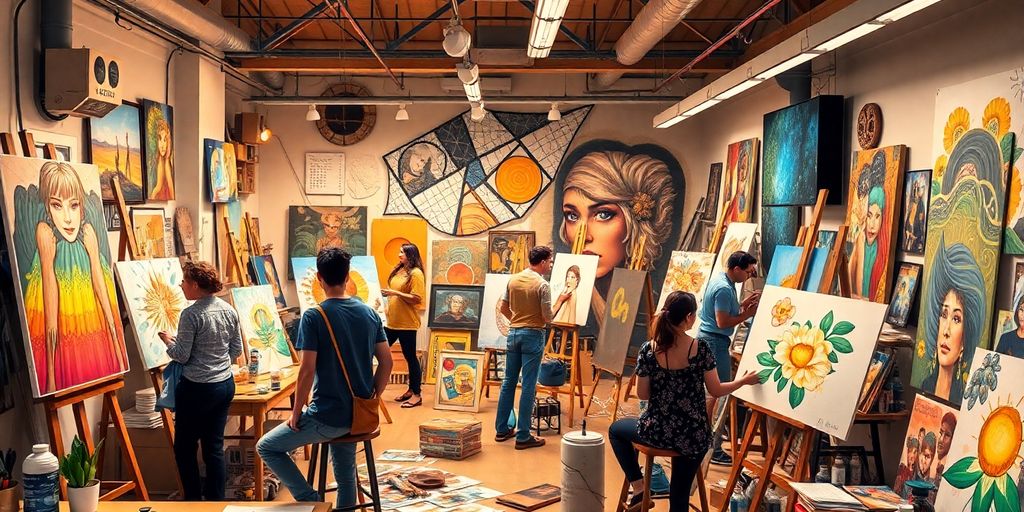Blockchain technology is changing the way artists interact with their fans and earn money. By removing middlemen and offering direct engagement, blockchain empowers artists to take control of their creative work. This article explores how blockchain provides new opportunities for artists, from transparent royalty payments to innovative revenue streams.
Key Takeaways
- Blockchain allows artists to manage their music and income directly, without needing middlemen.
- Smart contracts ensure artists receive payment instantly when their music is played or sold.
- Artists can create unique digital items like NFTs to sell directly to fans, enhancing their connection.
- Blockchain offers better protection for artists’ creative work against piracy and unauthorized use.
- New crowdfunding methods on blockchain help artists finance their projects and connect with supporters.
Understanding Blockchain’s Role in Empowering Artists

The Basics of Blockchain Technology
Blockchain is a secure and transparent technology that records transactions across many computers. This means that no single person or company controls the data, making it hard to change or tamper with. For artists, this is important because it helps preserve the rights of artists by maintaining a secure record of ownership for their creations.
How Blockchain Differs from Traditional Systems
In traditional systems, artists often rely on record labels and streaming platforms to distribute their music. This can lead to confusion and unfair payments. With blockchain, artists can distribute their music directly to fans, keeping more of the money they earn. This new way of doing things gives artists more control over their work and helps them earn a fairer share of revenue.
The Potential of Blockchain in the Arts
The potential of blockchain in the arts is huge. Here are some key benefits:
- Transparency: Artists can see how their music is being used and track payments easily.
- Smart Contracts: These are automatic agreements that ensure artists get paid right away when their music is played.
- Direct Engagement: Artists can connect with fans directly, offering unique experiences and building stronger relationships.
Blockchain technology can dramatically change the music industry, ensuring a more fair, transparent, and innovative system.
By understanding how blockchain works, we can see how it empowers artists and opens up new opportunities for them in the digital age.
Revolutionizing Royalty Payments and Transparency

Challenges with Traditional Royalty Systems
In the music industry, royalty payments have long been a source of frustration for artists. The traditional systems are often complicated and slow, leading to delayed payments and confusion about earnings. Here are some key issues:
- Complex structures: Many intermediaries are involved, making it hard for artists to track their earnings.
- Delayed payments: Artists can wait months to receive their money, which can be detrimental to their financial stability.
- Lack of transparency: It’s difficult for artists to know how much they are owed and when they will get paid.
Blockchain’s Solution to Royalty Transparency
Blockchain technology offers a promising solution to these challenges. By using a decentralized ledger, we can create a system that is both transparent and efficient. Here’s how:
- Instant payments: Smart contracts can automatically distribute royalties as soon as a song is played or downloaded.
- Clear tracking: Artists can see exactly how their music is being used and how much they are earning in real-time.
- Trust building: This transparency fosters trust between artists, producers, and other stakeholders.
Case Studies of Successful Implementations
Several projects have already begun to implement blockchain for royalty payments. For example:
- Audius: A decentralized music streaming platform that allows artists to earn directly from their fans without intermediaries.
- Myco: A platform that uses blockchain to ensure artists receive fair compensation for their work.
- Ujo Music: This platform enables artists to manage their rights and royalties through smart contracts.
By cutting out third parties, blockchain also paves the way for more direct and transparent relationships between musicians and their fans. This direct engagement not only enhances trust but also opens up new avenues for revenue generation.
Smart Contracts: Automating Artist Compensation
What Are Smart Contracts?
Smart contracts are self-executing agreements where the terms are written directly into code. This means that when certain conditions are met, the contract automatically executes the agreed actions. In the music industry, this can mean that every time a song is played or purchased, the smart contract ensures that the right people get paid without any delays.
Benefits of Smart Contracts for Artists
Using smart contracts can bring several advantages to artists:
- Instant Payments: Artists receive their royalties immediately when their music is used.
- Reduced Disputes: Since the terms are clear and automated, there are fewer chances for misunderstandings.
- Fair Compensation: Artists can set their own terms, ensuring they get a fair share of the revenue.
Real-World Examples of Smart Contract Use
Several artists and platforms are already using smart contracts to improve their compensation:
- Imogen Heap: Her project, Mycelia, uses smart contracts to manage music rights and payments.
- Ujo Music: This platform allows artists to sell their music directly to fans, using smart contracts for instant payments.
- Audius: A decentralized streaming service that ensures artists are compensated fairly through smart contracts.
Smart contracts can revolutionize how artists are compensated, making the process more transparent and efficient. They allow us to focus on our creativity rather than worrying about payment issues.
Direct Fan Engagement Through Blockchain
Eliminating Intermediaries in Fan Interactions
In the past, artists often relied on middlemen to connect with their fans. With blockchain, we can now engage directly with our audience. This technology allows us to sell merchandise, tickets, and even exclusive content without needing a third party. By cutting out these intermediaries, we can build a more personal relationship with our fans.
Creating Unique Experiences with NFTs
One exciting way we can engage fans is through Non-Fungible Tokens (NFTs). These digital assets can represent unique items like concert tickets or special edition albums. Fans can purchase these NFTs directly, giving them access to exclusive experiences. This not only supports us financially but also creates a sense of community among our supporters.
Building Stronger Artist-Fan Relationships
By using blockchain, we can foster a deeper connection with our fans. Here are some ways we can do this:
- Direct Communication: We can share updates and behind-the-scenes content directly with our fans.
- Reward Systems: Fans can earn tokens for engaging with our content, which they can redeem for exclusive perks.
- Feedback Opportunities: We can ask for fan input on our projects, making them feel valued and involved.
Blockchain technology is transforming how we connect with our fans, making interactions more personal and rewarding.
In conclusion, blockchain empowers us to engage with our fans in ways that were previously impossible. By eliminating intermediaries, creating unique experiences, and building stronger relationships, we can enhance our connection with our audience and open up new revenue streams.
New Revenue Streams for Artists
Tokenizing Music and Art
In the evolving landscape of the music industry, tokenizing music and art has emerged as a groundbreaking way for artists to generate income. By converting their work into unique digital assets, artists can sell these tokens directly to fans. This not only provides a new revenue stream but also allows fans to own a piece of the music they love. Here are some key points about tokenization:
- Artists can create limited edition NFTs (Non-Fungible Tokens) of their songs or artwork.
- Fans can purchase these NFTs, providing direct financial support to the artists.
- Each sale can generate ongoing royalties for the artist, ensuring they benefit from future transactions.
Crowdfunding Through Blockchain Platforms
Crowdfunding has become a popular method for artists to finance their projects. Blockchain platforms offer a transparent and efficient way to raise funds. Here’s how it works:
- Artists present their project on a blockchain platform.
- Fans can contribute funds in exchange for rewards, such as exclusive content or early access to new releases.
- The use of smart contracts ensures that funds are released only when specific milestones are met, protecting both artists and supporters.
Exploring Innovative Business Models
The traditional music industry often limits artists’ earning potential. However, blockchain opens the door to innovative business models that empower artists. Some examples include:
- Direct sales of music and merchandise through personal websites or platforms.
- Subscription models where fans pay a monthly fee for exclusive content and experiences.
- Fractional ownership of songs, allowing fans to invest in their favorite tracks and earn a share of the royalties.
By embracing blockchain technology, we can create a more equitable music industry where artists thrive and fans feel more connected to the music they love.
In conclusion, the integration of blockchain technology is reshaping how artists generate revenue. By tokenizing their work, utilizing crowdfunding, and exploring new business models, artists can achieve greater financial independence and foster stronger connections with their fans. This transformation is not just about making money; it’s about creating a sustainable ecosystem that benefits everyone involved in the creative process.
Enhancing Intellectual Property Protection
The Importance of IP Protection for Artists
As artists, we know that protecting our intellectual property (IP) is crucial. Without proper protection, our creative works can be misused or stolen. This is where blockchain technology comes into play. By integrating blockchain into the intellectual property ecosystem, creators, artists, inventors, and companies can ensure that their works are protected in a secure and tamper-proof manner.
Blockchain’s Role in Securing Creative Works
Blockchain provides a transparent and unchangeable record of ownership for our creative works. This means that every time we create something, it can be timestamped on the blockchain, establishing clear proof of ownership. Here are some key benefits of using blockchain for IP protection:
- Immutable records: Once a work is registered on the blockchain, it cannot be altered or deleted.
- Easy tracking: We can easily track who owns what and how our works are being used.
- Automated enforcement: Smart contracts can automatically enforce licensing agreements, preventing unauthorized use of our music or art.
Preventing Unauthorized Use and Piracy
Piracy is a significant issue in the creative industry, costing artists millions. Blockchain helps combat this by creating a clear record of ownership and distribution. This makes it easier to identify and address unauthorized use. Here’s how blockchain can help:
- Transparent ownership: Everyone can see who owns a piece of art or music.
- Real-time tracking: We can monitor how our works are being used across various platforms.
- Efficient dispute resolution: If someone uses our work without permission, blockchain can help resolve disputes quickly.
By leveraging blockchain technology, we can create a safer environment for our creative works, ensuring that we receive the recognition and compensation we deserve.
Streamlining Rights Management with Blockchain
Managing rights in the music industry can often feel like navigating a maze. Blockchain technology simplifies this process by providing a clear and transparent way to track and manage intellectual property (IP) rights. Here’s how it works:
Simplifying the Complex Web of Rights
- Clear Ownership Records: Each song can have a unique ID on the blockchain, making it easy to identify who owns the rights.
- Automated Licensing: Smart contracts can automate the licensing process, ensuring that artists get paid fairly and promptly.
- Efficient Tracking: Every time a song is played or downloaded, the transaction is recorded, allowing artists to see how their work is being used.
Automating Licensing and Rights Administration
With blockchain, we can automate many of the tedious tasks associated with rights management:
- Smart Contracts: These digital contracts execute automatically when certain conditions are met, reducing the need for intermediaries.
- Instant Payments: Artists can receive payments immediately after their music is used, ensuring they are compensated fairly.
- Dispute Resolution: The transparent nature of blockchain helps resolve disputes quickly, as all transactions are recorded and verifiable.
Ensuring Fair Compensation for All Stakeholders
The use of blockchain in rights management not only benefits artists but also ensures that all stakeholders are compensated fairly. By eliminating the opacity of traditional systems, we can create a more equitable environment for everyone involved in the music industry.
Blockchain technology is transforming rights management by revolutionizing ownership and transparency.
In conclusion, as we embrace blockchain, we can look forward to a future where rights management is streamlined, fair, and efficient, allowing artists to focus on what they do best: creating music.
The Future of Blockchain in the Music Industry

As we look ahead, the impact of blockchain on music distribution is becoming increasingly clear. We are witnessing a shift where artists gain more control over their work and how they earn from it. This technology is not just a trend; it’s a game changer for the music industry.
Predictions for Blockchain Adoption
- We expect to see more artists embracing blockchain technology.
- Increased transparency in royalty payments will likely become the norm.
- Fans will have more direct ways to support their favorite musicians.
Emerging Technologies and Blockchain Integration
- The combination of blockchain with AI could lead to personalized music experiences.
- Virtual reality may offer immersive concerts and interactions.
- New platforms will emerge, allowing artists to connect directly with fans.
The Long-Term Impact on Artists and Fans
- Artists will enjoy real-time payments and better tracking of their music use.
- Fans will have unique opportunities to engage with artists through NFTs and other digital assets.
- Overall, we foresee a more equitable music industry where everyone benefits from the changes brought by blockchain.
The future of music is bright with blockchain, as it promises to reshape how we create, share, and enjoy music.
Challenges and Considerations in Blockchain Adoption

As we explore the integration of blockchain technology in the arts, we must acknowledge the challenges that come with it. While blockchain offers exciting opportunities, there are several hurdles we need to overcome to ensure its successful adoption.
Overcoming Barriers to Entry
- Education and Awareness: Many artists and industry professionals are still unfamiliar with blockchain technology. This lack of understanding can hinder its adoption.
- Resource Limitations: Smaller organizations may struggle with the infrastructure needed to implement blockchain solutions effectively.
- Technical Complexity: The technology can be complex, making it difficult for non-technical users to navigate.
Addressing Technical and Legal Challenges
- Regulatory Uncertainty: Different countries have varying laws regarding copyright and digital assets, which can create confusion.
- Legal Liability: The decentralized nature of blockchain raises questions about who is responsible for disputes and how they are resolved.
- Scalability Issues: As the number of transactions increases, the system can slow down, affecting efficiency.
Ensuring Accessibility for All Artists
- Cost of Implementation: The initial costs of adopting blockchain can be high, which may deter some artists.
- User-Friendly Platforms: We need to develop platforms that are easy to use for artists of all backgrounds.
- Support and Resources: Providing resources and support for artists to learn about blockchain is crucial.
In summary, while blockchain has the potential to revolutionize the arts, we must work together to address these challenges and ensure that all artists can benefit from this technology.
By tackling these issues head-on, we can pave the way for a more equitable and transparent future in the arts, where artists have greater control over their work and revenue streams.
Conclusion
In summary, blockchain technology is changing the music industry for the better. It gives artists more control over their work and helps them earn money directly from their fans. By using blockchain, musicians can track their earnings clearly and get paid fairly and on time. This technology also allows artists to connect with their fans in new ways, creating unique experiences and opportunities. As blockchain continues to grow, we can expect even more exciting changes that will help artists thrive and make the music world a fairer place for everyone.
Frequently Asked Questions
What is blockchain and how does it help artists?
Blockchain is a digital system that records transactions securely and transparently. It helps artists by allowing them to sell their music directly to fans, ensuring they get paid fairly and quickly.
How does blockchain improve royalty payments?
Blockchain makes royalty payments clearer and faster. It creates a public record of how music is used, so artists can see exactly when they earn money and receive it right away.
What are smart contracts?
Smart contracts are automatic agreements written in code. They make sure that artists get paid whenever their music is played or downloaded, without needing any middlemen.
Can artists really make more money with blockchain?
Yes! Blockchain lets artists keep a larger share of their earnings by removing middlemen like record labels. They can also create and sell unique digital items to fans.
What are NFTs and how do they benefit artists?
NFTs, or Non-Fungible Tokens, are unique digital items that artists can sell. They allow fans to own special versions of songs or artwork, giving artists new ways to earn money.
How does blockchain protect artists’ work?
Blockchain keeps a secure record of who owns a song or artwork. This makes it harder for others to steal or use an artist’s work without permission.
What challenges do artists face with blockchain?
Some artists may find it hard to understand the technology or how to use it. There are also legal and technical issues that need to be addressed for wider adoption.
What does the future hold for blockchain in the music industry?
The future looks bright! As more artists and companies use blockchain, we can expect fairer pay, better connections with fans, and new ways to share music.





